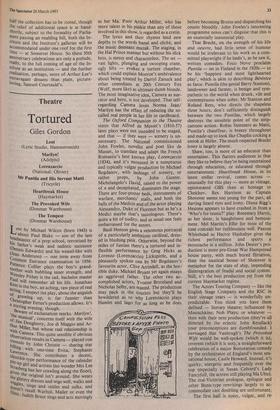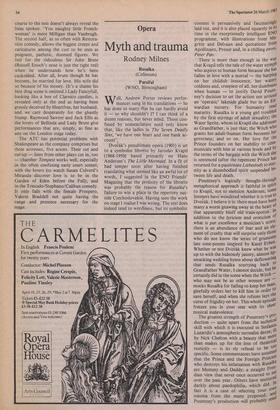Theatre
Tortured
Giles Gordon
Lent
„ I suspect the play, about the anguish growing up, is far funnier than Christopher Fettes's production allows. It's a stirring evening, though.
Beware of exclamation marks. Marilyn!, the musical', concerns itself with the wife ,°,.f Jim Dougherty, Joe di Maggio and Ar- thur Miller, but whose real relationship is with Camera. This quite sensible if obvious observation results in Camera — played con tbr.en.7o/0 by John Christie — sharing star billing with one-time Evita, Stephanie • Lawrence. She contributes a decent, identikit-type performance of the calendar ,13111-1-LP girl and actress (no wonder Mrs Lee ,3!rasberg has her crawling along the floor), .g.iventhe original isn't around. She wears Iwo! glittery dresses and wigs well, walks and Iggles, sings and smiles and sulks, and esn't recall Warhol, Mailer or even the 'tuns. Judith Bruce sings and acts movingly
as her Ma. Poor Arthur Miller, who has more talent in his pinkie than any of those involved in this show, is regarded as a cretin.
The lyrics and their rhymes lend new depths to the words banal and cliche, and the music demeans muzak. The staging, in the Hal Prince manner but without his slick brio, is messy and characterless. The set — vast lights, plunging and swooping crane, ugly lifts — evokes a torture chamber, which could explain Monroe's ambivalence about being treated by Darryl Zanuck and other comedians at 20th Century Fox (Wolf, more like) as ultimate dumb blonde. The most imaginative idea, Camera as nar- rator and hero, is not developed. That self- regarding Camera loves Norma Jean/ Marilyn has the effect of reducing the so- called real people in her life to cardboard.
The Oxford Companion to the Theatre states that Alfred de Musset's (1810-57) later plays were not intended to be staged, and that — if they were — scenery is un- necessary. The National commissioned John Fowles, novelist and poet like de Musset, to translate and adapt the French Romantic's best known play, Lorenzaccio (1834), and it's mounted in a sumptuous and typically vulgar production by Michael Bogdanov, with lashings of scenery, or rather props, by John Gunter. Michelangelo's David, raised to the power of n and decapitated, dominates the stage. There are four-poster beds, instruments of warfare, merchants' stalls, and both the balls of the Medicis and of the actor playing Alessandro, Duke of Florence but as he's a Medici maybe that's tautologous. There's quite a bit of nudity, and as usual one feels embarrassed for the actors.
Basil Henson gives a venomous portrayal of a particularly ambitious cardinal, dress- ed in blushing pink. Otherwise, beyond the miles of fustian there's a tortured and in- flexible performance by Greg Hicks as Lorenzo (Lorenzaccio) Lickspittle, and a pleasantly spoken one by Mr Bogdanov's favourite actor, Clive Arrindell, as the hor- rible duke. Michael Bryant yet again essays an aggrieved father. The other two ac- complished actors, Yvonne Bryceland and Nicholas Selby, are wasted. The production may pack in the tourists but they'll be bewildered as to why Lorenzaccio plays Hamlet and lago for as long as he does before becoming Brutus and dispatching his cousin bloodily. John Fowles's interesting programme notes can't disguise that this is an essentially inessential play.
That Brecht, on the strength of his life and oeuvre, had little sense of humour would be irrelevant to his work as a com- mitted playwright if he hadn't, as he saw it, written comedies. Foco Novo proclaim Puntila — set in Finland in the 1920s — to be his 'happiest and most lighthearted play', which is akin to describing Berenice as farce. Puntila (the genial Barry Stanton), landowner and farmer, is benign and sym- pathetic to the world when drunk, vile and contemptuous when sober. Mr Stanton and Roland Rees, who directs the shapeless three hours, don't sufficiently distinguish between the two Puntilas, which largely destroys the unsubtle point of the strip- cartoon action. Robin Summers as Matti, Puntila's chauffeur, is breezy throughout and made-up to look like Chaplin cocking a snook at Hitler. The much respected Brecht irony is largely absent.
Shaw, too, is more of an educator than entertainer. This flatters audiences in that they like to believe they're being entertained through education, or educated through entertainment. Heartbreak House, in its latest stellar revival, comes across — unusually for this play — more as vintage, opinionated GBS than as homage to Chekhov. Rex Harrison as Captain Shotover seems too young for the part, all darting lizard eyes and irony. Diana Rigg's Hesione appears to have crashed in from a 'Who's for tennis?' play. Rosemary Harris, as her sister, is haughtiness and bemuse- ment. Mel Martin's Ellie for most of the time conceals her ruthlessness well. Paxton Whitehead as Hector Hushabye gives the richest performance and sports a moustache in a million. John Dexter's pro- duction is more pre-Great War Hampstead house party, with much bored flirtation, than the nautical house of Shotover is metaphor for the state of ship, impending disintegration of feudal and social system. Still, it's the best production yet from the current Haymarket regime.
The Actors Touring Company — like the English Stage Company and the RSC in their vintage years — is wonderfully un- predictable. You think you have them defined — literary theatre; influenced by Mnouchkine; Noh Plays; or whatever — then with their next production (they're all directed by the eclectic John Retallack) your preconceptions are dumbfounded. I envisaged that Vanbrugh's The Provoked Wife would be well-spoken (which it is), reverent (which it is not), a straightforward celebration of a major Restoration comedy by the orchestrator of England's most sen- sational house, Castle Howard. Instead, it's quirky, energetic and frequently over the top (especially in Susan Colverd's Lady Fancyfull, the actress still playing Ma Ubu). The cod-Victorian prologue, epilogue and other Bunn-type rewritings largely to ac- commodate cast doubling are unfortunate.
The first half is noisy, vulgar, and re- course to the text doesn't always reveal the lines spoken. 'You naughty little French- woman' is more Milligan than Vanbrugh. The second half, as so often with Restora- tion comedy, allows the biggest creeps and caricatures among the cast to be seen as poignant, pathetic, doomed figures. We feel for the ridiculous Sir John Brute (Russell Enoch's nose is just the right red) when he understands how he's been cuckolded. After all, brute though he has become, he married for love. His wife did so because of his money. (It's a shame his best drag scene is omitted.) Lady Fancyfull, looking like a box of Clarnico candies, is revealed only at the end as having been grossly deceived by Heartfree, her husband, and we care desperately for the ghastly frump. Raymond Sawyer and Jack Ellis as the lovers of Bellinda and Lady Brute give performances that are, simply, as fine as any on the London stage today.
The ATC has potential problems with Shakespeare as the company comprises but three actresses, five actors. Their cut and cut-up — lines from other plays cut in, too — chamber Tempest works well, especially in the often confusing early court scenes; with the lovers (to watch Susan Colverd's Miranda discover love is to be in the Garden of Eden before the Fall); and in the Trinculo/Stephano/Caliban comedy. It only fails with the female Prospero, Valerie Braddell not quite having the range and presence necessary for the mage.















































 Previous page
Previous page